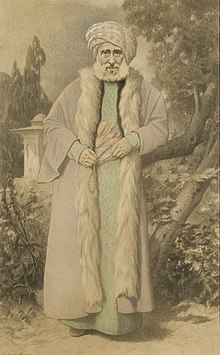Abraham Salomon Camondo
This article needs additional citations for verification. (July 2014) |

Life and career

He was born in Constantinople,[1][2] during the Ottoman Empire. In 1832, he inherited a banking business and a fortune from his brother Isaac (who had died in Vienna a year before), and he was able to expand it greatly during his lifetime, partly through real estate investment. Camondo lived in the Galata district with his wife Clara, whom he had married on 25 May 1804, and their son Raphael (1810–1866).
While
Count Camondo exercised substantial influence with the sultans
Camondo was active on behalf of other Jews. He established in Constantinople a central consistory for the Jews of the empire, of which he was almost continuously the president; he introduced reforms into the communal administration; and he founded in 1858 an educational institution, the Institution Camondo, at Peri Pasha, the poorest and most densely populated suburb of the capital. Shops for tailoring and shoemaking were soon added. On account of this school, its benevolent founder was excommunicated by certain fanatical rabbis, and he endured otherwise much vexation; yet it flourished for thirty-two years and trained the majority of the Jewish officials then in the service of the Ottoman government.
Dying at the age of 92 in
See also
References
- ^ The Encyclopædia Britannica, Vol.7, Edited by Hugh Chisholm, (1911), 3; Constantinople, the capital of the Turkish Empire...
- ^ Britannica, Istanbul Archived 2007-12-18 at the Wayback Machine: When the Republic of Turkey was founded in 1923, the capital was moved to Ankara, and Constantinople was officially renamed Istanbul in 1930.
- ^ Nadine Gasc and Gérard Mabille, The Nissim de Camondo Museum (Paris: Fondation Paribas, n.d.), p. 10.
- Sources
 This article incorporates text from a publication now in the public domain: Singer, Isidore; et al., eds. (1901–1906). "Camondo". The Jewish Encyclopedia. New York: Funk & Wagnalls.
This article incorporates text from a publication now in the public domain: Singer, Isidore; et al., eds. (1901–1906). "Camondo". The Jewish Encyclopedia. New York: Funk & Wagnalls.
